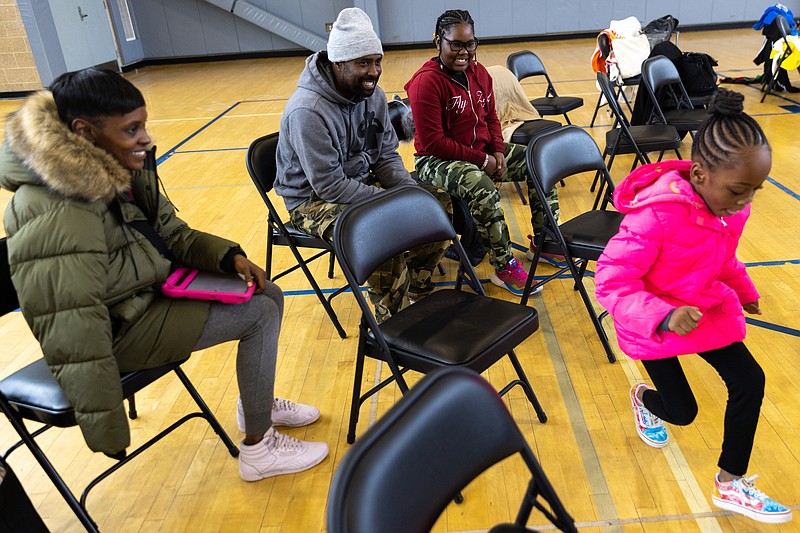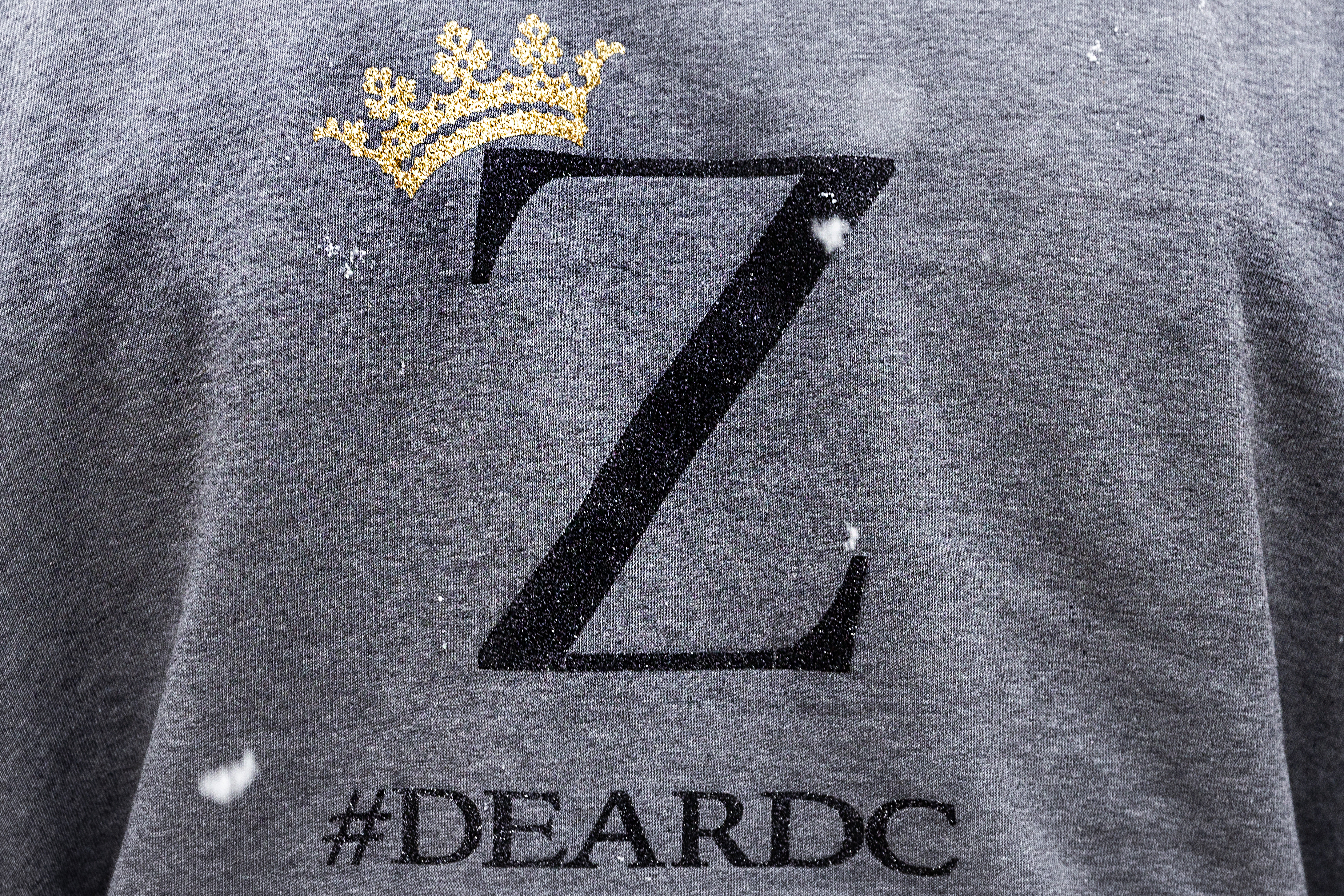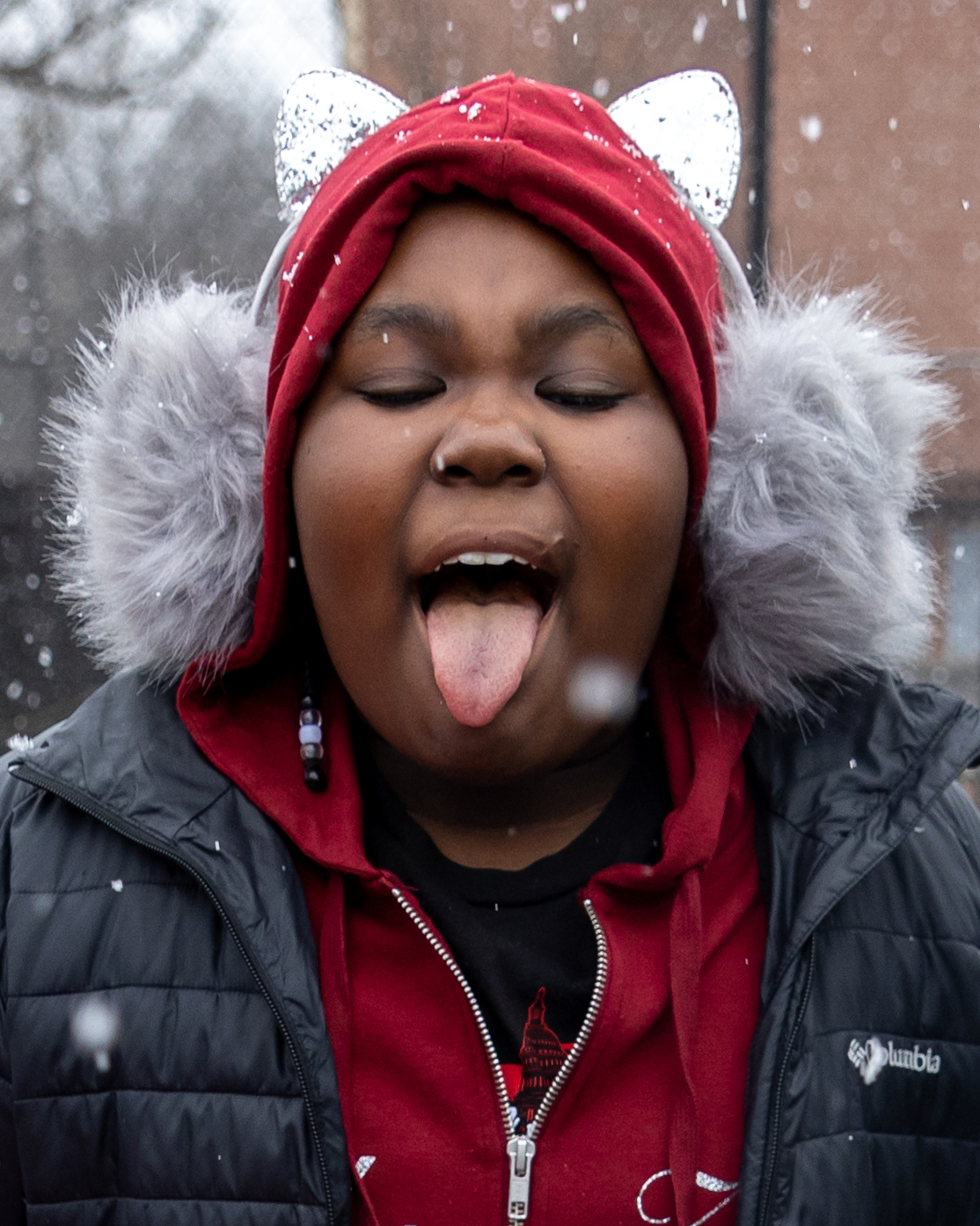Fly Zyah walked onto the stage in her purple, metallic Doc Martens and the crowd cheered.
"Are y'all ready to have some fun?!" she asked the audience. A woman yelled in response: "Let's go, Fly Zyah!"
Sixth-grader Zyah Brown was the youngest artist onstage for the Kennedy Center's "Sounds of the DMV: Hip Hop Showcase" this spring. Although the four other performers that night were adults, Zyah knew she could hold her own.
The microphone sat easily in her hand as she began rapping in front of a silhouette of herself striking her signature pose: Elbows bent, fingers pointing to her two Afro puffs.
Young, Black and Gifted
Flow so exquisite
Repping D.C. so I'm similar to the Mystics
You want it, come and get it
Break bread, let's split it
Hustle in my blood, the marathon's never finished.
When Zyah tries to make sense of the world -- of why a police officer would kneel on George Floyd's neck, why so many people died of the coronavirus, why police pushed her family and friends -- she pulls out her phone, opens the notes app and starts writing lyrics.
At only 11 years old, Zyah is able to sort through complex feelings and translate them into gripping lyrics that speak for a generation of children grappling with the same problems. This thoughtful perspective has resonated beyond her neighborhood, and even the city, providing a window for adults into how it feels to be a child growing up right now.
Zyah has become a fixture in the Washington music and social justice scenes. Her songs about racism and police violence -- and Black joy and Black girlhood -- earned her a spot on a list of the Kennedy Center Next 50 cultural leaders. She has performed at the Universal Hip Hop Museum in the Bronx, the Apollo Theater in Manhattan, her school's winter formal and on flatbed go-go trucks at Washington protests. She also wrote a play called "Legend" that she hopes to be performing within a year.
"She could have just been another little Black girl in D.C., because she does have the odds against her, but she refused to accept the odds," said longtime local organizer Nee Nee Taylor. "She knows she's a winner and she has a gift."
Her parents manage her career, attending all of her shows and taking along her 6-year-old sister, Morghan, when they can. Her father wrote the lyrics for her debut song as a 2-year-old, "Peanut Butter Remix," which was set to the beat of "Truffle Butter" by Nicki Minaj, Drake and Lil Wayne. By the time Zyah was in the first grade, she was writing her own songs, her mother said.
In school, Zyah grew to love Latin class and found that learning new words and phrases expanded her English vocabulary and improved her songwriting. When she is deep into writing lyrics and stumped, she turns to RhymeZone, a website where she can input a word and see a list of rhymes, synonyms, antonyms, similar-sounding words and more.
But her favorite class is civics, she said, referring to herself as a "civics class fanatic." She's her homeroom president at Washington Latin Public Charter School, and she plans to be the actual president -- of the United States -- one day.
She watches the news with her parents, who try to answer her questions with honesty. During the height of the pandemic, she started asking, "Why don't some people like Black people?"
Those questions, and her parents' answers, fuel her music.
The kids that kinda look like me
They life is sped up
Don't fall for the okey doke tricks
That's just a set up
You want it, go get it
It's yours, don't ever give up
For my ancestors who shed blood and fought back their masters
Stopping that cycle, ending those chapters.
'HE CAN'T BREATHE'
Her parents knew Zyah would see the video. They decided she should watch it at home, sitting next to them.
As she processed the news clips showing a Minneapolis police officer kneeling on George Floyd's neck, killing him, Zyah cried. "Why would somebody do that to somebody else?" her mother, Danielle Champ, 40, recalled Zyah asking.
What she saw left Zyah wondering whether that meant something so terrible could happen to her, her family or someone she knows.
Yes, they told her, it could.
"It made me feel differently about people in the world," Zyah said. "Everybody's not as good as they seem. And everybody's not, like, as friendly or as real as they seem."
The family spent the summer of 2020 protesting throughout the streets of the nation's capital to demand justice, reject racism and call for a better future. Soon, Zyah was performing widely in the city.
Organizers requested that she come to rallies. There, she rapped songs she had written just weeks or days before, moved by the people she met who also were standing up against police brutality.
Zyah was 8 going on 9 at the time, and as she saw how her words inspired people -- making them cheer and smile -- she gained confidence. The Fly in her stage name stands for "First Love Yourself," and she tries to bring that positive, caring outlook to all her songs, even those about painful topics.
On election night 2020 at Black Lives Matter Plaza, near the White House, Zyah was to perform on a go-go truck. But before her set, she and her parents said, police started shoving the crowd.
Her father, Ron Brown, now 45, feared that his children would be hurt. Zyah heard people screaming and crying and realized she and her sister were crying, too. In the chaos, she saw her father get "trampled" to the ground by officers. "Then it just kind of hit me what was going on," she said, "and what the world was really like."
Brown said he was taken to the police precinct before being released. Any charges or citations were dismissed, he said. When asked about this occurrence, police responded with an incident report that did not identify Brown but said a person was arrested for resisting arrest, crossing a police line and inciting violence -- all of which Brown denied.
Once things had settled down, Zyah had to decide: Would she still perform? Ultimately, she wanted to rap her song "Generation Speaks."
If you could see what I see
People screaming, he can't breathe
Got his knee on his neck while they watching him plead
Should've did the right thing and just let him leave
Now we marching in the streets
Just us, no peace.
When she got home, she started writing a song inspired by what had happened that day. How it felt watching police take her father, and her fear of what the officers would do next. She wrote about the city, her home and how it felt to be let down. She called the song "Dear D.C."
I always try to represent
But the city don't represent me
I try to be the best
But you fail to see what's in me.
'CONQUER THE WORLD LIL SIS'
Zyah has been impressing the adults in the room for most of her life.
Oscar-winning actress Viola Davis has shared a video of Zyah rapping on her Instagram page with the caption: "This made me cry! Conquer the world lil sis'. YOU are our hope fly.zyah." In February 2020, the rapper Rapsody invited then-8-year-old Zyah onstage at the Fillmore in Silver Spring, Md.
"There's a young girl by the name of Zyah who wants to come and spit some. Is that all right with y'all, D.C.?" Rapsody asked the cheering crowd. "She rap 200 times better than I did at her age."
Her fans and supporters say her lyrics are infused with wisdom about the world and also her inherent innocence. After all, she is still a kid who loves to create slime and believes that wearing her pajamas inside out and putting a spoon under her pillow can summon snow.
Her biggest dream is making sure everyone has a place to live. "I want to help every single homeless person in the world, if I can," she said. She wants animals to have a home, too. Then, she said, she would like to "stop the police from killing and hurting us. ... Just leave us alone, honestly."
At the Kennedy Center event, everyone seemed to know who Zyah was. They sought out the 5-foot-3 girl moving in a sea of towering grown-ups. The executive director of the Washington chapter at the Recording Academy came over to give Zyah's mother a business card.
Toward the front of the audience sat Carissma McGee, a 22-year-old Howard University student who first saw Zyah during the 2020 racial justice protests and has followed her life and career on Instagram since then.
When Zyah walked by her seat before the show, McGee reached out and gave her a hug.
"I'm so excited to see you today!" she told Zyah. "I came just for you!"
Toward the end of her 12-minute set, Zyah got to her most popular song, the one everyone wanted to hear. And she could feel that the crowd was with her. When she waved her hand high above her head, they waved theirs, too.
She was serious while rapping a verse about a harrowing experience her family had with police. When she got to the chorus, a smile slipped onto her face as she left the crowd with a message: "Dear D.C., I hope you listen to me."
Alice Crites contributed to this report.


